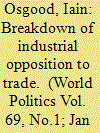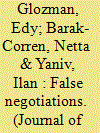| Srl | Item |
| 1 |
ID:
152232


|
|
|
|
|
| Summary/Abstract |
This article documents systematic deviations from standard models of trade politics, each of which has the effect of undermining sustained efforts at coherent industrial opposition to trade. Industries have internal disagreements about liberalization, support for trade liberalization extends bilaterally across borders in the same industry, and comparative disadvantage industries feature convincing expressions of public support for liberalization. These surprising outcomes are explained by a model of trade politics that emphasizes three factors: firm heterogeneity in export performance, product differentiation, and reciprocal liberalization. The author uses a new data set of industry attitudes about fifteen US trade agreements to show that product differentiation is strongly correlated with these outcomes, even conditional on plausible alternatives. The author concludes that public position-taking and lobbying on trade politics have been fundamentally altered by the rise of product variety; trade's opponents and indifferents have been overwhelmed by pro-globalization firms breaking out to support trade on their own.
|
|
|
|
|
|
|
|
|
|
|
|
|
|
|
|
| 2 |
ID:
139409


|
|
|
|
|
| Summary/Abstract |
The usual purpose of negotiations is to explore options and reach an agreement, if possible. We investigated a notable exception to this generalization, where a party negotiates without any intention of reaching an agreement. False negotiation occurs when a party gains more by stalling the negotiations until an external change takes place that improves its position considerably. While false negotiators aim to avoid agreement within the current frame of the negotiations, they also aim to keep the negotiation process alive, since walking away from the negotiation table could endanger their position. We report the results of a study that compared the actions of false and sincere negotiators. The false negotiators used competitive tactics that encumbered the negotiations, yet they concealed their intentions by maintaining a facade of cooperation. Our theoretical discussion is focused on the balancing act involved in false negotiations and the challenges it poses for actors in social, managerial, and political settings. We conclude our analysis with an example from the realm of international negotiations.
|
|
|
|
|
|
|
|
|
|
|
|
|
|
|
|